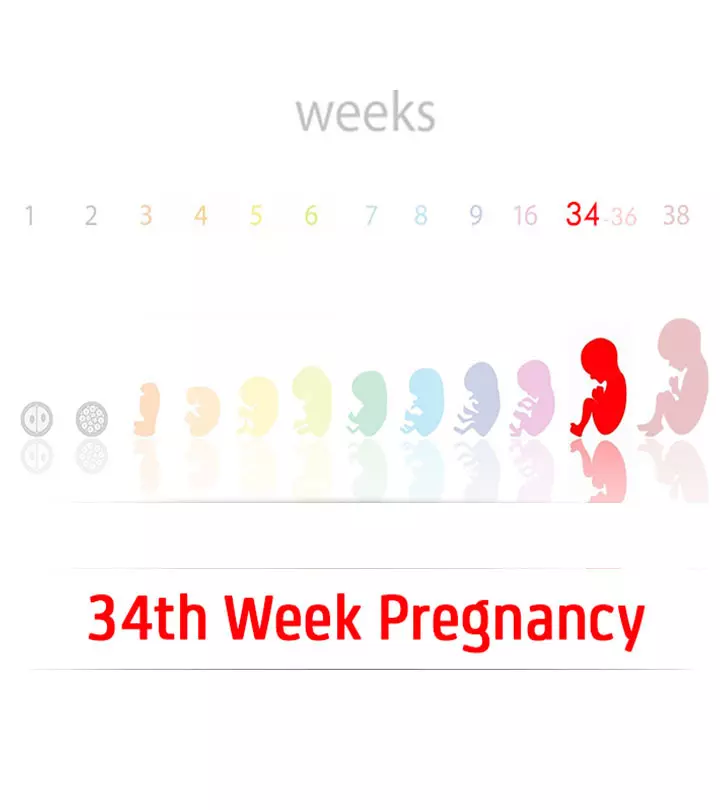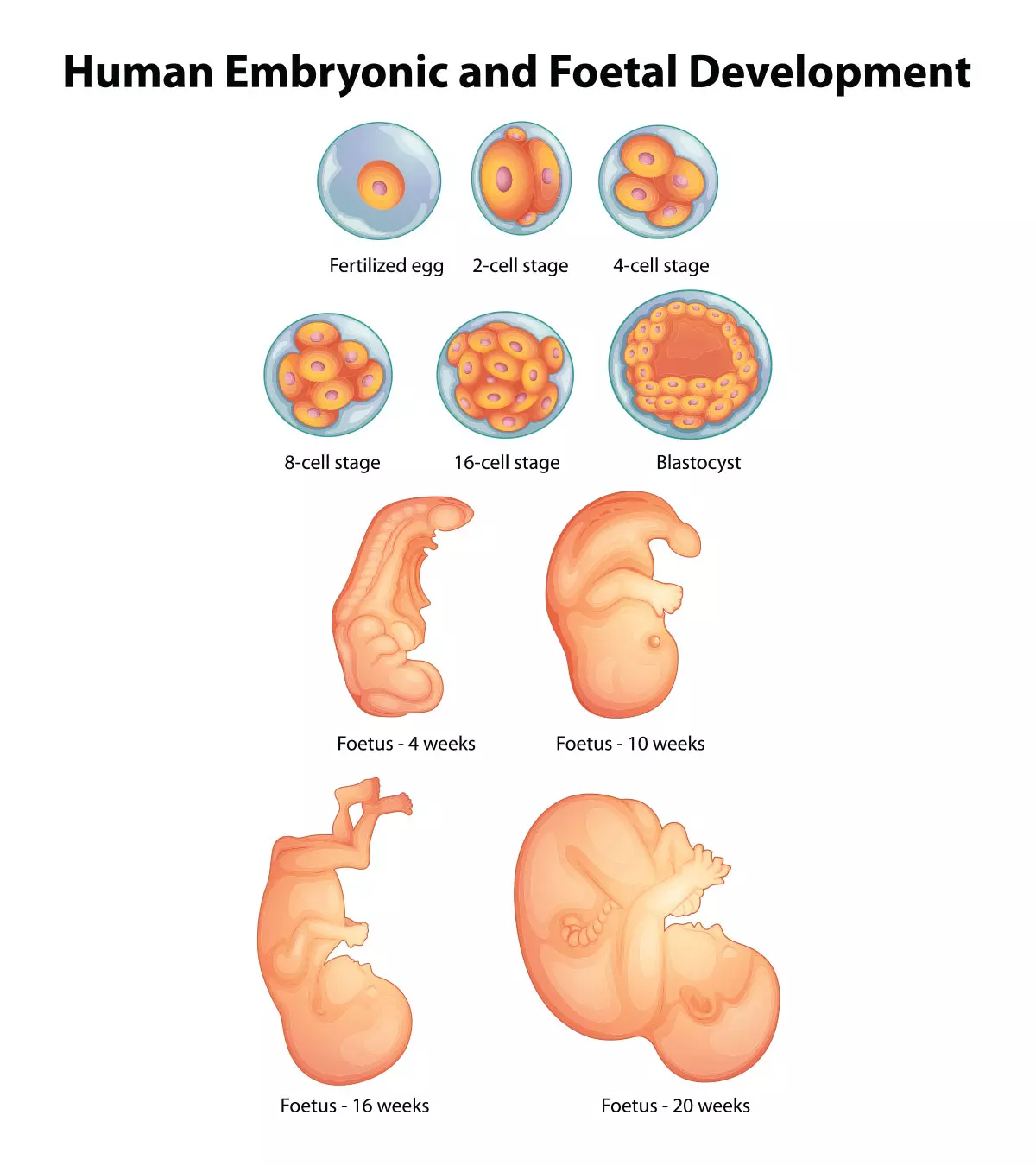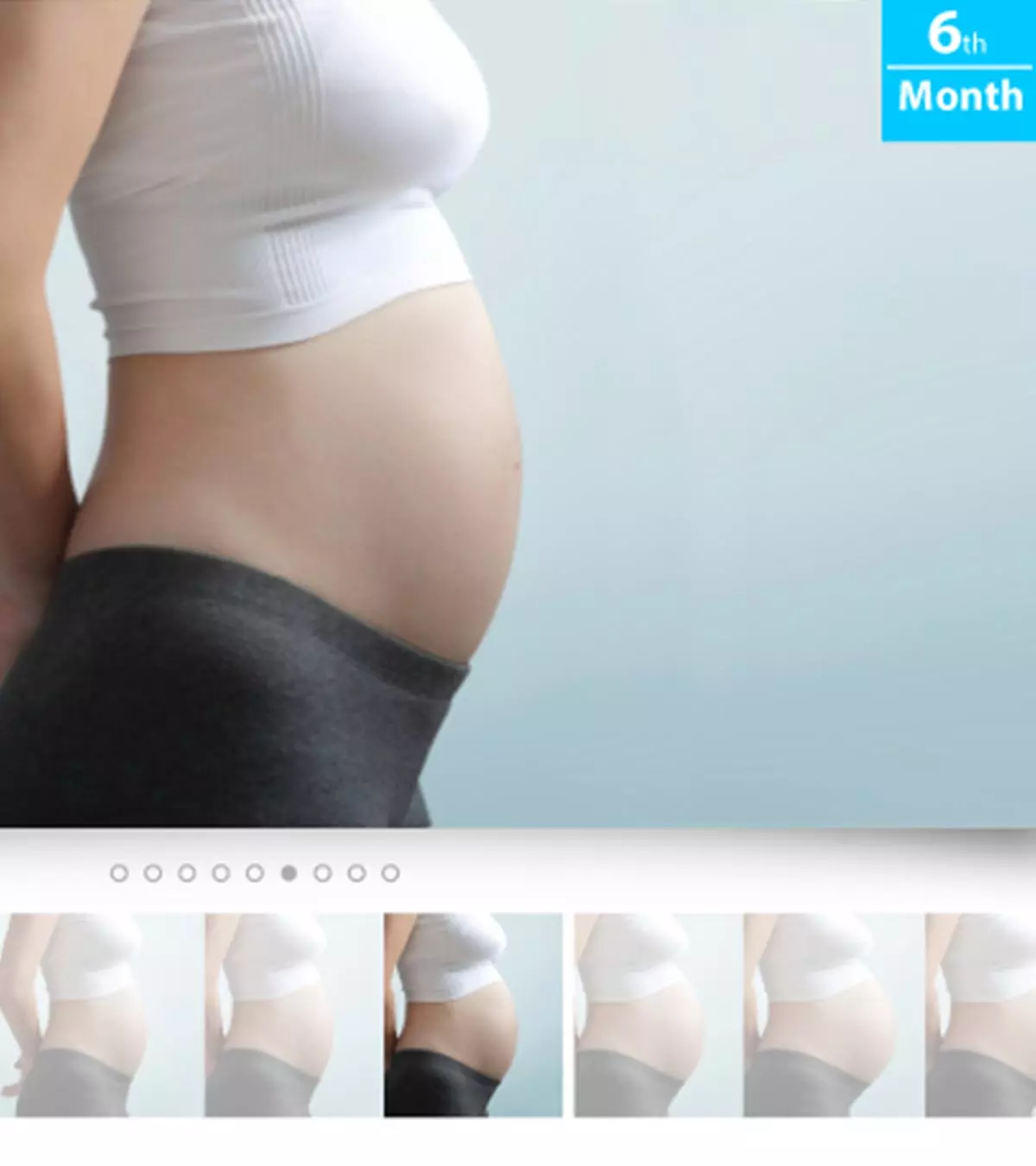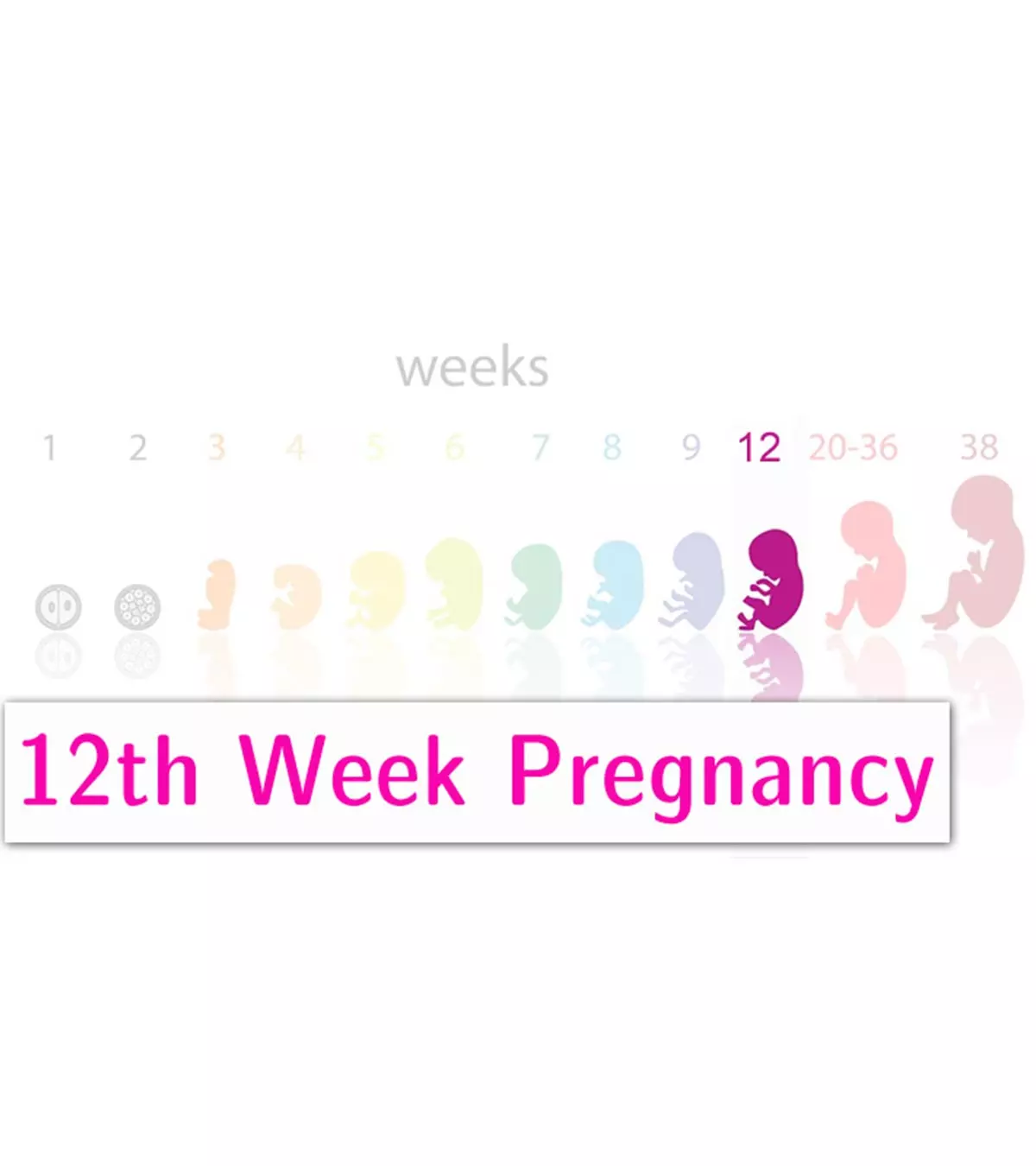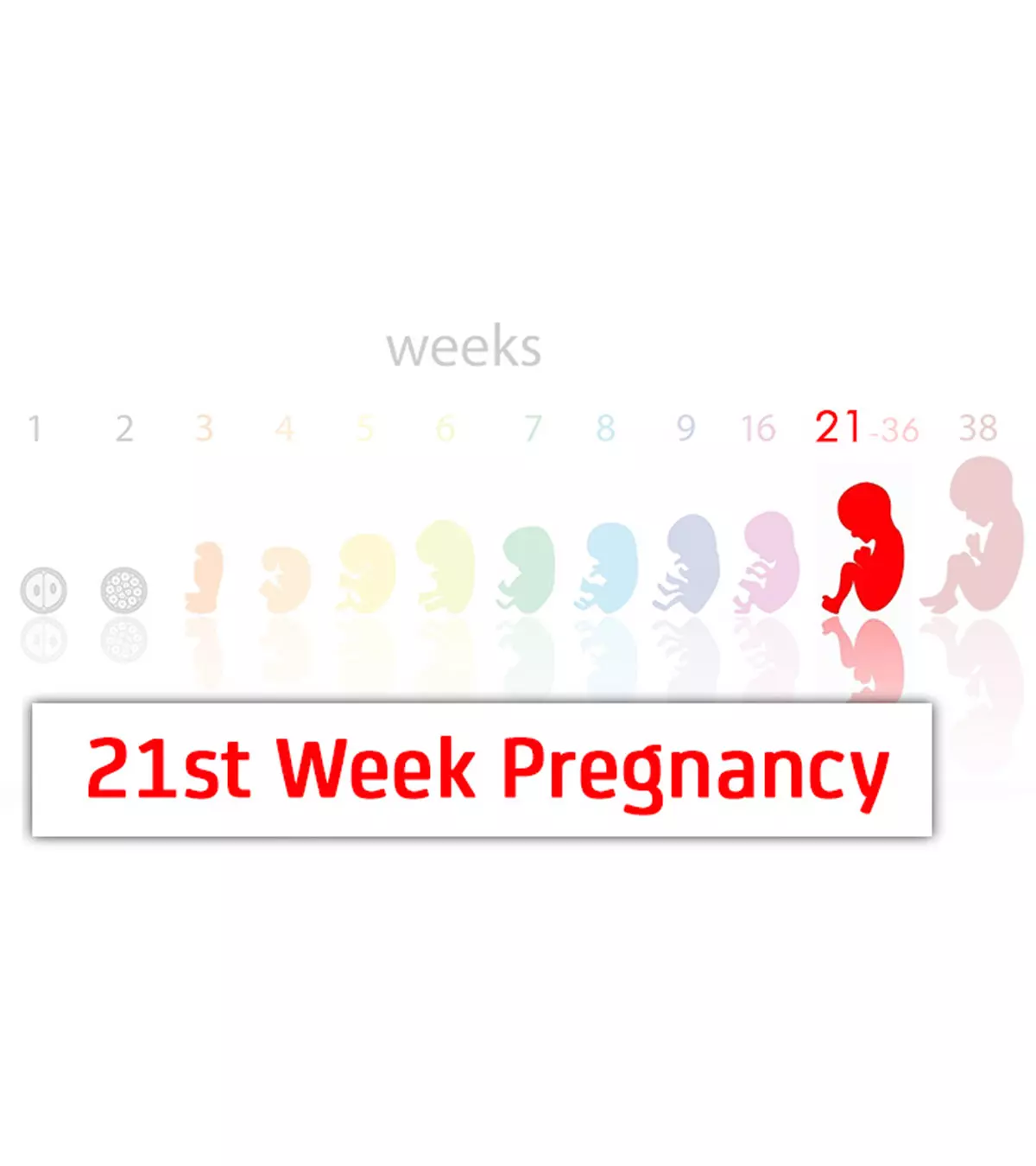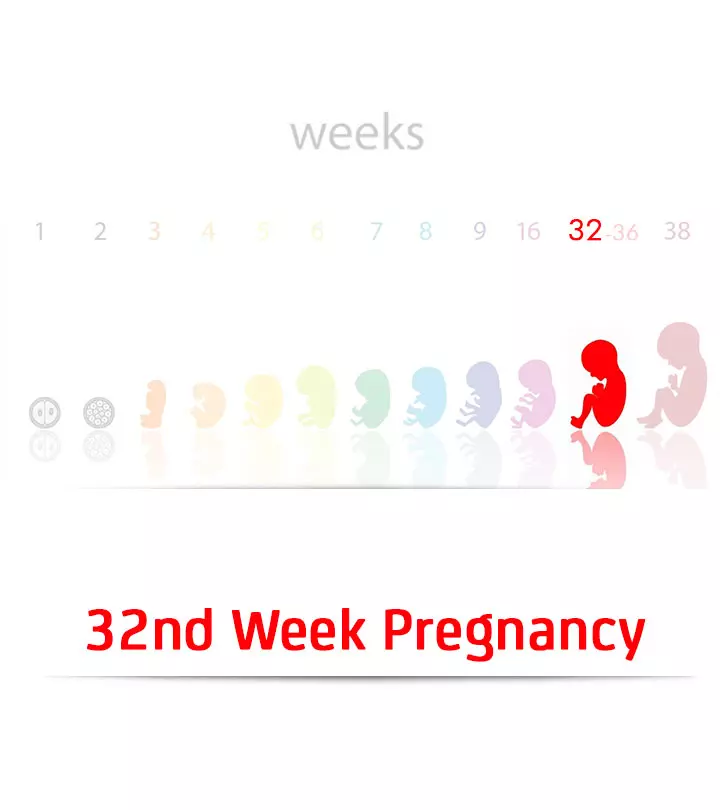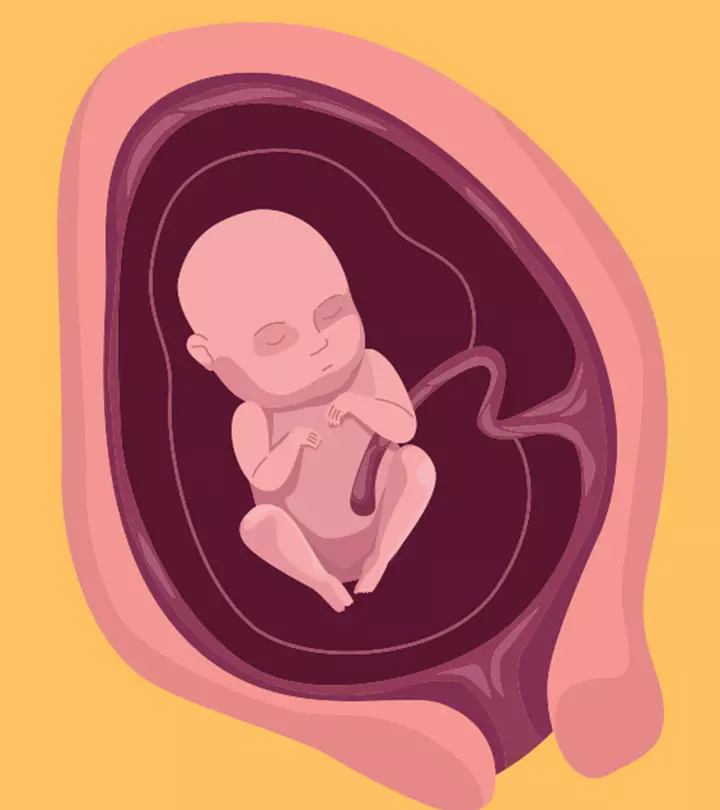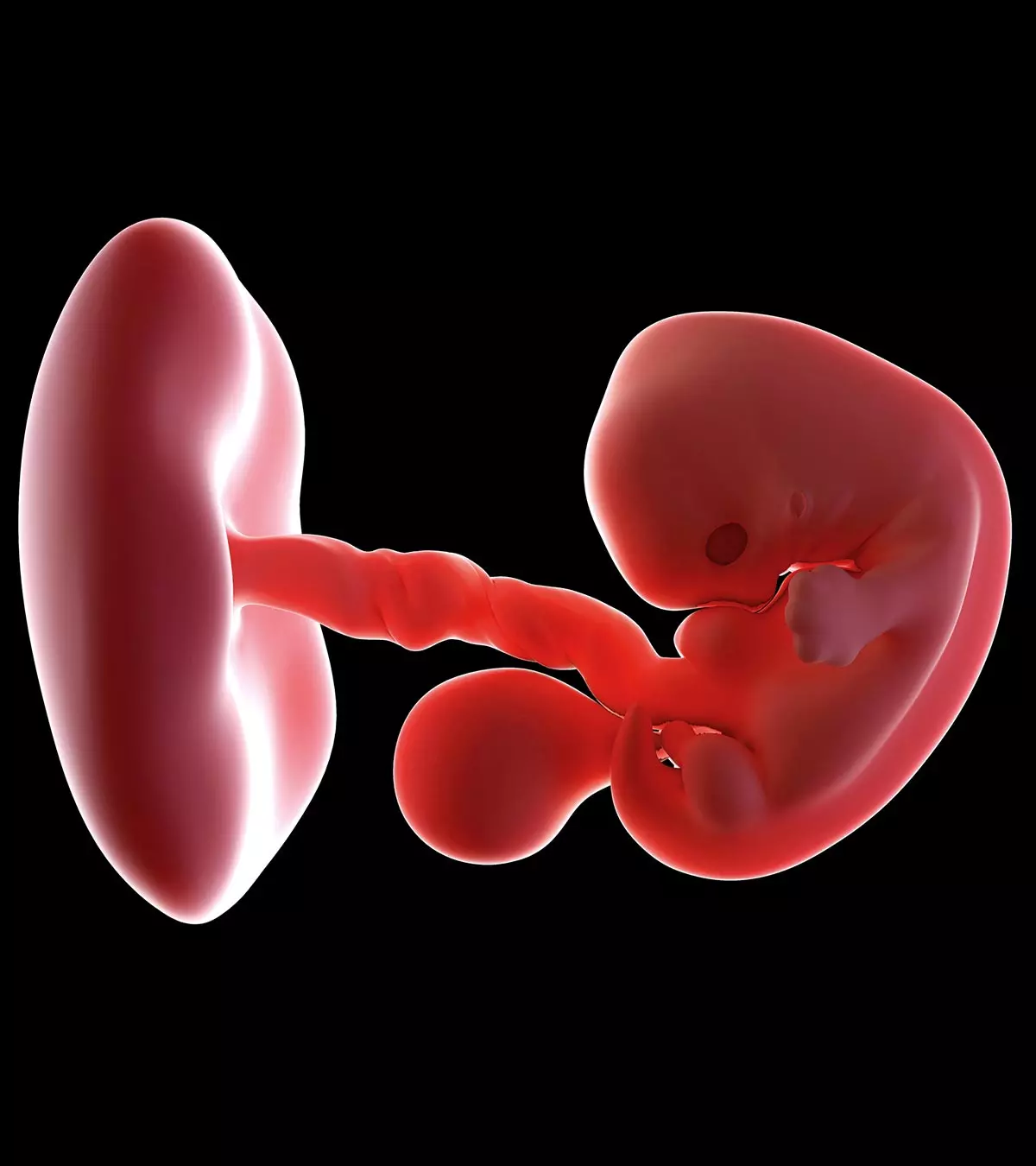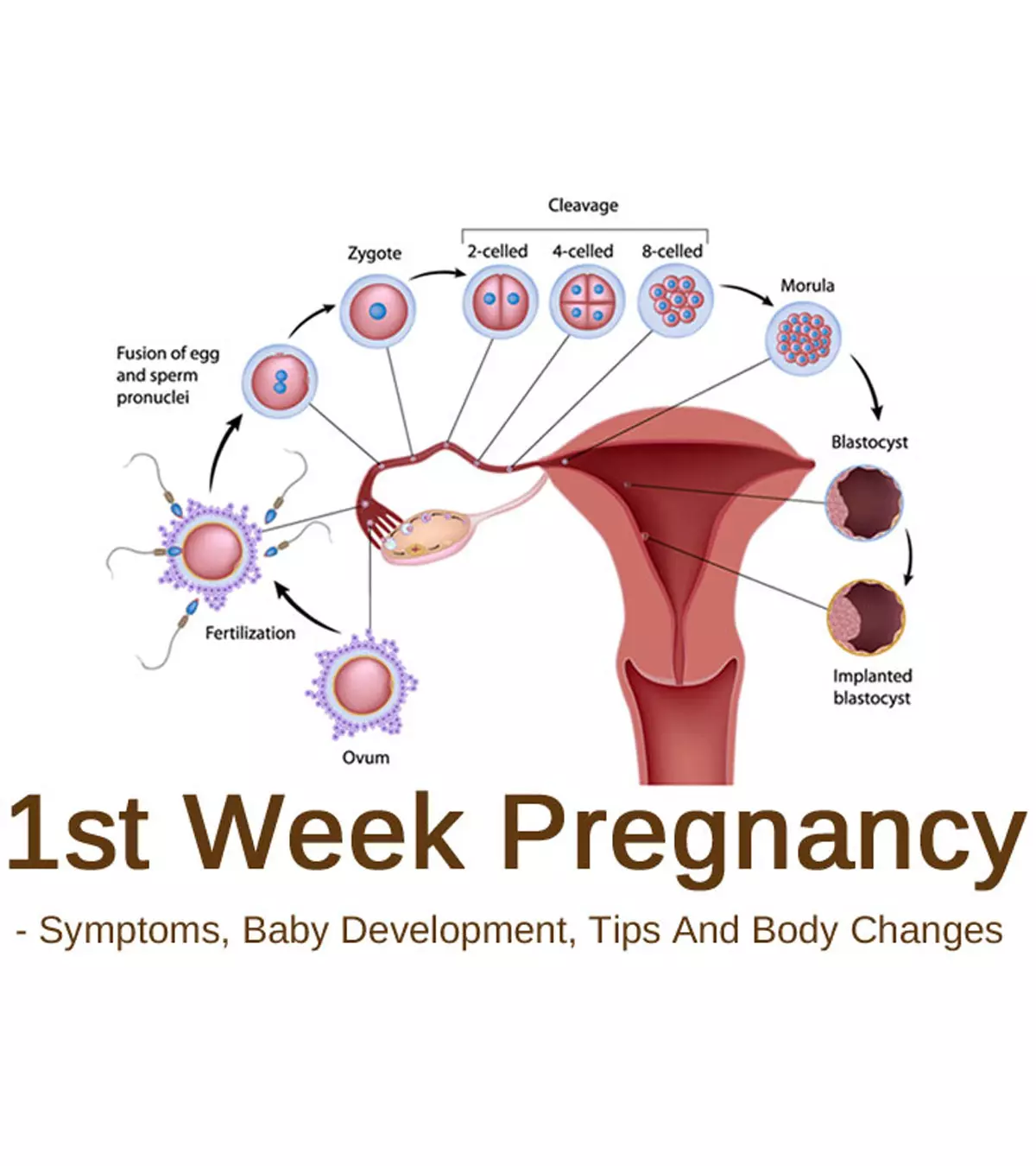
Image: MomJunction Design Team
The first symptom of your pregnancy is considered to be your missed period (1). Along with that, there are other symptoms of pregnancy in the first month that you might experience. Your body begins to prepare for the baby, and there are many hormonal changes taking place as well. But an interesting fact that you should note is that you are not pregnant in the first two weeks of your pregnancy. So why are the two weeks counted in the gestation period? Read on to understand more about this and other changes that are happening in your body when you are 1 week pregnant.

Key Pointers
- A missed period is often seen as the first indication of pregnancy.
- You may experience bloating, food cravings, fatigue, and cramps throughout the body.
- A healthy diet, exercise, and avoiding smoking and alcohol can help with having an uncomplicated pregnancy.
- Consult your healthcare practitioner for guidance on your symptoms and any other concerns you may have.
The First Week Of Pregnancy
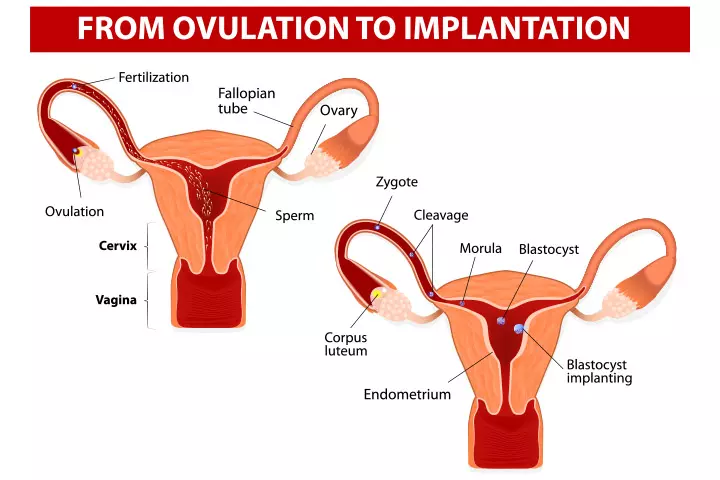
Experiencing symptoms of pregnancy in the first week is uncommon. The first week is primarily when the body prepares for pregnancy, so it is important to understand what to expect in the coming weeks. Most women might not know they are pregnant in the first week as it is difficult to feel any change in the reproductive system at this phase.
However, if you have been planning to get pregnant, you must be tracking your menstrual cycle diligently using an ovulation calculator. In such a case, you may be able to figure out or guess if you are experiencing one-week pregnancy symptoms. Let’s see how to calculate it.
The calculation of pregnancy week by week starts from the first day of your last period – this calculation is used to determine what is called the gestational age. That means you are actually on your period in the first week. Two weeks after that, or around day 14, you start ovulating, which is why the early symptoms of pregnancy and your period symptoms are similar (2).
After five or six days of ovulation, implantation occurs, which means the fertilized egg is implanted into the uterus lining. This is the time when you technically become pregnant (3). The first two weeks are when your body is preparing for the pregnancy, which is why they are considered a part of the 40-week pregnancy period.
Fetal Development In the First Week Of Pregnancy
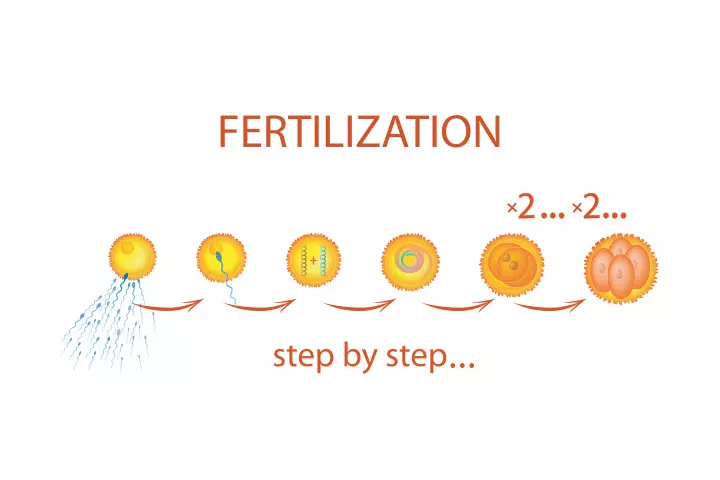
There is no sign of the baby at the early stages of pregnancy in the first week as this is the time when your body is preparing for ovulation. However, the first stage of its development starts in the coming weeks when the mature egg is fertilized by the sperm and forms the zygote, which is the first cell. Then cell division results in a blastocyst or ball of cells (4).
Then there is the division of cells, after which the fertilized egg is implanted into the uterine wall. Finally, the embryo is formed and this starts the initial development stage of the baby (5).
Continue reading to know the first week of pregnancy symptoms in your body.
 Quick fact
Quick factBody Changes During The First Week Of Pregnancy
In the first week of pregnancy, you will be on your periods. So you may not know your early pregnancy symptoms. During this time, your body sheds the previous month’s eggs and uterine lining (7). After the first week, new and mature eggs will be released, and the uterine lining begins to thicken again.
In the next section, we will discuss the symptoms that are observed during and before periods, which are quite similar to the first week symptoms of pregnancy.
What Are The First Week Pregnancy Symptoms?
The first trimester of pregnancy begins with the first week of pregnancy. While many women may not feel any changes or symptoms during this week, some symptoms that you may notice include the following (8) (9).
- As the fluctuation in hormones is severe at this time, you may experience bloating and discomfort during the first week.
- You may feel extremely tired even if you are doing nothing. That could be because your body is preparing for pregnancy.
The symptoms may get more intense in case of multiple pregnancies. An anonymous mother of twin children shares the symptoms she observed during her first week of pregnancy. She says, ” Two days after conception, Genki Husband (her husband) and I went for a run outside, a short 5k. It was at that moment, I knew for certain we were going to be pregnant.During our run, I got super exhausted and had to stop after 2 miles, thinking I was going to lose my stomach. This was the first time ever, so I knew something was up (i).”

- You may notice swollen and tender breasts around this week due to hormonal changes in the body. You may crave salty or sweet foods during the first week. Food cravings and aversions are likely to happen, and they increase in the coming weeks.
- Headache, cramps, and pain in the lower back are some other common symptoms that you may experience in the first week. However, if they become severe, call your doctor.
- Changes in vaginal discharge are another early sign of pregnancy when the cervical mucus turns thicker.
- Emotional changes, like mood swings or heightened emotions, may occur due to hormonal fluctuations.
- Hormonal shifts may lead to increased oil production, causing acne breakouts.
Takara Oneá, a mother, recalls in her vlog the symptoms she had in her first week and says, “During the time of my pregnancy, I had a very increased thirst like I was dying of thirst and drinking a lot of Sprite thinking I was dehydrated… I also honestly thought the Sprite would help with me being so nauseous during this time, so I was drinking a bunch of those for my upset stomach, as well as saltine crackers, which are the only things I wanted. I was extremely tired and couldn’t get out of bed. I didn’t want to be bothered because of the nausea (ii).”

Read on for a few tips on how to take care of yourself in the first week of pregnancy.
Tips For First Week Of Pregnancy
Chances are you won’t know when the first week of pregnancy is. So if you are planning to become pregnant, it is essential that you start maintaining a healthy lifestyle right away. Here are a few things to keep in mind to enhance your fertility and stay healthy in the first week of pregnancy (10).
- If you are a smoker, stop smoking right from the time you decide to conceive. Also, stop the consumption of alcohol. to avoid any risk of pregnancy complications, such as miscarriage.
- Maintain an active lifestyle by eating healthy foods and exercising. Your body needs to be healthy and fit to carry the baby.
- You may ask your doctor about the vitamins needed for prenatal care and start taking them to increase the chances of a healthy pregnancy.

- Make sure you are sleeping well; this is important to stay mentally and physically active.
- If you have been planning to have a baby, keep track of your menstrual cycle. You can use ovulation calendars and apps to make your job easier.
- If you have chronic conditions such as diabetesiA condition where your body has trouble controlling blood sugar levels , thyroid disorders, or high blood pressure, work with your doctor to manage them before and during pregnancy.
- Reduce exposure to toxic substances such as pesticides, cleaning agents with strong chemicals, and excessive radiation to protect early fetal development.
 Point to consider
Point to considerIf you need more guidance at this stage, you may talk to your gynecologist or obstetrician.
Tips For Dad-to-be
Your support plays a crucial role in ensuring a smooth and healthy pregnancy for your partner. Here are some practical and meaningful ways you can get involved right from the start (11):
- Work out the due date together to track the pregnancy timeline.
- Ensure both your partner and you maintain a healthy lifestyle.
- Engage in activities that help manage stress, like exercising together or practicing mindfulness.
- Encourage your partner to take vitamin D and folic acid supplements for a healthy pregnancy.
- Support open communication with a midwife or GP about pregnancy symptoms or concerns.
- Sign up for pregnancy emails to stay informed about pregnancy progress.
- Start planning your finances and explore available time-off options from work.
- Look for antenatal classes in your area to prepare for the journey ahead.
Actively engaging in these supportive actions during the first week of pregnancy can help create a strong foundation for a healthy and well-prepared pregnancy journey.
What Can You Ask Your Doctor?
When you and your partner plan to have a baby, talk to your doctor. Clear all your doubts, such as a change in diet, use of prenatal vitamins, tracking the ovulation cycle, and more. Get as much information as you need for a successful conception.
Frequently Asked Questions
1. Can a pregnancy test be positive at one week?
A pregnancy test kit may be able to detect pregnancy as early as ten days after unprotected sex, but you cannot trust these results completely. The best time to take the test would be three weeks after sexual intercourse(12).
2. What should you not do before a pregnancy test?
If you use a home pregnancy test kit, you should avoid drinking too much water before the test as it may dilute the urine and affect the test result(13).
3. Does a faint line on the pregnancy test strip mean I am pregnant?
A faint line on the pregnancy test strip may represent an early pregnancy, or it may be an evaporation line. The kit detects pregnancy hormones in your urine, so a faint line could mean low levels of the hormone in your body, which may indicate that you are in your early days of pregnancy. It is also possible that the faint line is an evaporation line if you read the test after the recommended time in the instructions. Keep in mind that certain medications may result in a faint line. For example, medicines for infertility may have the pregnancy hormone which the test kit may show (14) (15).
The first week of pregnancy can be tricky since you are not technically pregnant, and the baby hasn’t started developing yet. During this time, you may not even realize that you are 1 week pregnant because the early signs, such as bloating, cramps, and swollen breasts, often resemble those of premenstrual syndrome. Therefore, it is recommended that you take the necessary steps right when you begin planning your pregnancy. Further, consult your obstetrician/gynecologist to understand the measures you should take and the dietary changes required to ensure effective pre-pregnancy health.
Infographic: Things You Must Do While Planning Your Pregnancy
One-week pregnancy symptoms may not be too evident, making it very important to be careful right from when you start planning your pregnancy. So take notes from this infographic and pin it to your wall to have the essential tips to follow for a safe and healthy pregnancy.
Some thing wrong with infographic shortcode. please verify shortcode syntax
Personal Experience: Source
MomJunction articles include first-hand experiences to provide you with better insights through real-life narratives. Here are the sources of personal accounts referenced in this article.
i. Symptoms of Pregnancy first weeks! Signs to look out for + how I knew!https://www.youtube.com/watch?v=P_–G52KmmE&feature=youtu.be
Personal Experience: Sources
MomJunction articles include first-hand experiences to provide you with better insights through real-life narratives. Here are the sources of personal accounts referenced in this article.
i. Week 1-10 Vegan Twin Pregnancy.
https://genkikitty.wordpress.com/2016/12/15/week-1-10-vegan-twin-pregnancy/
ii. Symptoms of Pregnancy first weeks! Signs to look out for + how I knew!
https://youtu.be/P_–G52KmmE
References
- Am I Pregnant?
https://my.clevelandclinic.org/health/articles/9709-pregnancy-am-i-pregnant - The menstrual cycle.
https://www.betterhealth.vic.gov.au/health/conditionsandtreatments/menstrual-cycle - You and your pregnancy at 1 to 3 weeks.
https://www.nhs.uk/pregnancy/week-by-week/1-to-12/1-2-3-weeks/ - Week 1; Embryology.
https://embryology.med.unsw.edu.au/embryology/index.php/Week_1 - Embryology Week 1.
https://www.ncbi.nlm.nih.gov/books/NBK554562/ - Fetal Development.
https://my.clevelandclinic.org/health/articles/7247-fetal-development-stages-of-growth - The Menstrual Cycle: An Overview.
https://www.stanfordchildrens.org/en/topic/default?id=menstrual-cycle-an-overview-85-P00553 - Early Signs of Pregnancy.
https://americanpregnancy.org/pregnancy-symptoms/early-signs-of-pregnancy/ - Menstrual Cycle.
https://my.clevelandclinic.org/health/articles/10132-menstrual-cycle - First trimester.
https://www.pregnancybirthbaby.org.au/first-trimester - Getting involved in the pregnancy – for dads and partners.
https://www.tommys.org/pregnancy-information/dads-and-partners/getting-involved-in-the-pregnancy - Pregnancy Tests.
https://www.plannedparenthood.org/learn/pregnancy/pregnancy-tests - How early can home pregnancy tests show positive results?
https://utswmed.org/medblog/home-pregnancy-tests/ - Pregnancy Tests.
https://womenshealth.gov/a-z-topics/pregnancy-tests - Pregnancy Tests.
https://my.clevelandclinic.org/health/diagnostics/9703-pregnancy-tests
Community Experiences
Join the conversation and become a part of our nurturing community! Share your stories, experiences, and insights to connect with fellow parents.
Read full bio of Dr. Christian Pope
Read full bio of Sakshi Mishra
Read full bio of Rebecca Malachi
Read full bio of Aneesha Amonz








